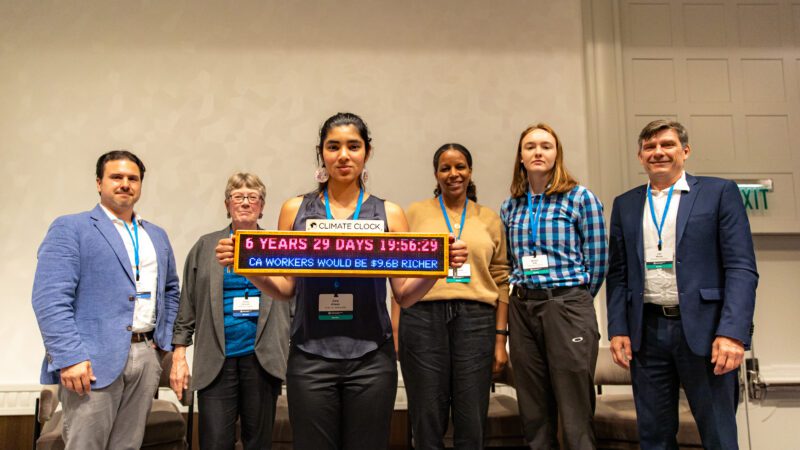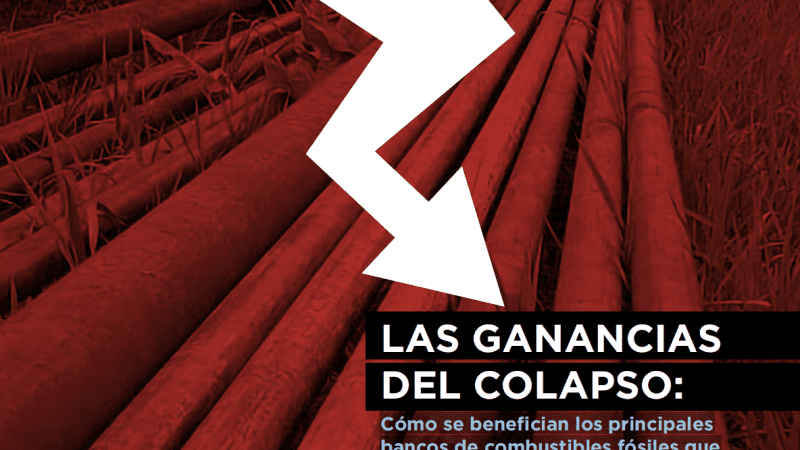Coastal GasLink: A dangerous project that blatantly violates Indigenous rights
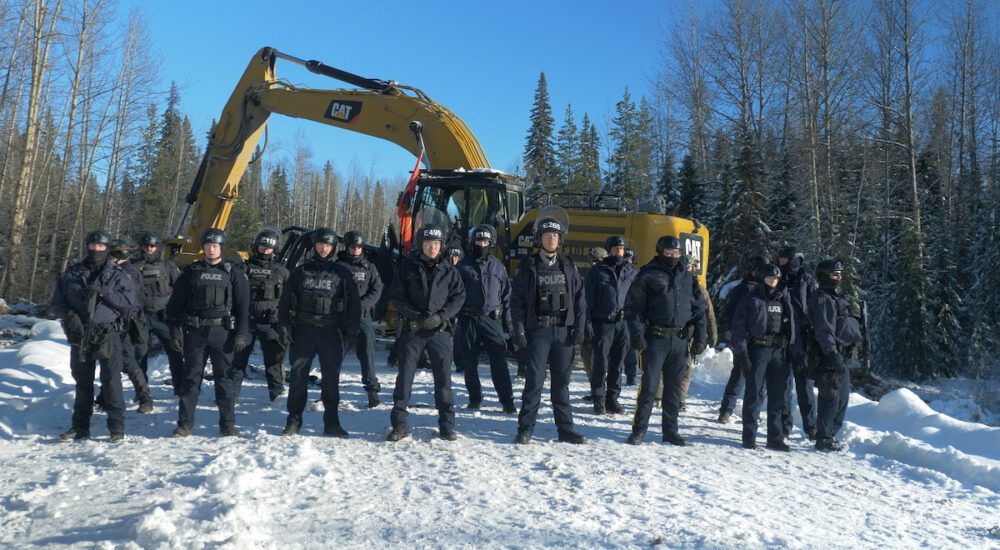
Built by TC Energy, the 670-km Coastal GasLink pipeline is intended to carry fracked gas from Dawson Creek to Kitimat, BC, where it will be converted to liquified natural gas (LNG) for export to global markets. Despite unequivocal Wet’suwet’en opposition to the project, the pipeline runs through 22,000 square kilometres of the Nation’s unceded territory. It also crosses more than 206 ecologically sensitive waterways. The pipeline is built to carry 2.1 billion cubic feet per day of fracked gas, with a peak capacity of up to five billion cubic feet per day.
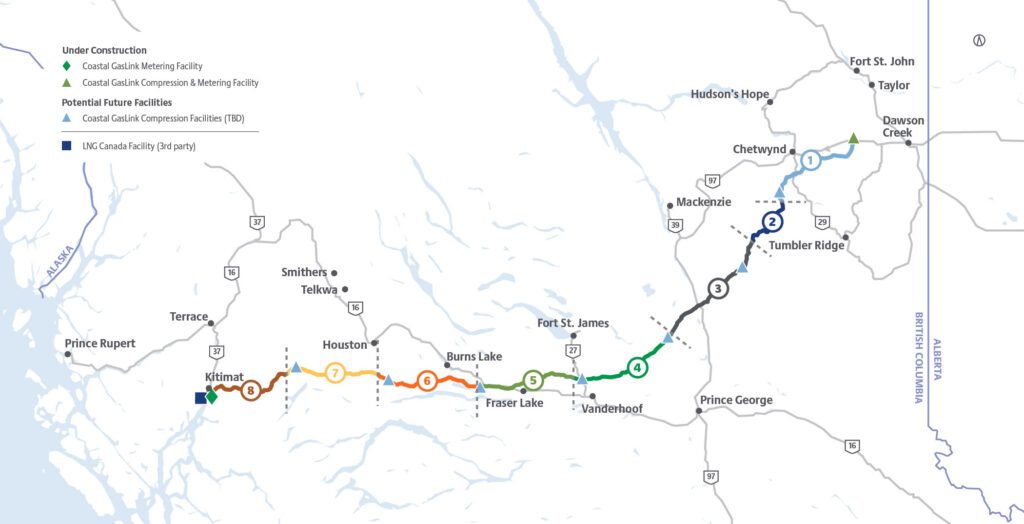
Route of the Coastal Gaslink pipeline (Source: CBC)
Fuelled by the Royal Bank of Canada
With an estimated CAD $6.6 billion price tag, the project reached financial close in April 2020. The Royal Bank of Canada (RBC) is among five commercial banks (including Bank of Montreal, Scotiabank, CIBC and TD bank) that provided the project with working capital. RBC provided CAD $275 million in project finance – including a co-financed $6.5 billion loan and a $40 million corporate loan, and $200 million in co-financed working capital – while acting as financial advisor for the pipeline.
RBC also holds over 85 million shares in TC Energy, which translates to about 8.6% of the company or more than a $1.03 billion-dollar stake (at $58/share). RBC not only finances TC Energy; it’s deeply invested in the company, and doubly exposed in the Coastal GasLink pipeline.
In September 2021, RBC joined the Glasgow Financial Alliance for Net Zero (GFANZ) – a coalition of financial institutions committed to accelerating economic decarbonization. Yet, between January and October 2021, RBC provided fossil fuel companies with $23.9 billion in loans and underwriting and $51 billion in investments.
Increasing carbon emissions at a critical juncture
Coastal GasLink contradicts both Canada’s international climate commitments and B.C. legislation intended to stem the climate crisis. The pipeline is expected to transport up to five billion cubic feet of liquefied natural gas (LNG) per day. When burned, this will produce an estimated 585.5 million pounds of C02 each day, which is equivalent to the C02 emissions released from burning over 300 million pounds of coal, or the greenhouse gas emissions from driving more than 59,000 passenger vehicles for a year.
Regardless of how fossil fuel companies try to spin the science, LNG is not a clean, low-emission “bridge fuel,” nor an effective way to reduce our climate footprint. It’s also becoming an economic liability. As we break our dependence on oil and gas production, investing in LNG (instead of sustainable energy) represents a serious financial risk — and the evidence is already mounting. Last year, TC Energy had to provide $3.3 billion in additional temporary bridge financing to cover ballooning project costs. TC Energy had previously given another short-term credit facility to the pipeline, which continues to see repeated cost overruns.
In April 2020, Export Development Canada (EDC) signed an agreement to loan Coastal GasLink potentially hundreds of millions of dollars. A June 2020 report from Horizon Advisors recommended that the Canadian government legally block Export Development Canada (EDC) from supporting fossil fuel energy projects. “Although Canada has committed to decarbonizing its economy over the next 30 years, EDC on the other hand continues to invest In fossil fuel projects,” Horizon Advisors Executive Director Amin Asadollahi told Canada’s National Observer. “These investments not only undermine Canada’s international climate efforts but also increase EDC’s exposure to carbon risks.”
Violating Wet’suwet’en law, land title, and FPIC rights
The Wet’suwet’en have re-asserted their land use, occupancy, hereditary governance system, and remain the title holders with the authority and jurisdiction to control the unceded lands where the pipeline is currently being built. The project contravenes ‘Anic ‘niwh’it’én (Wet’suwet’en), federal, and international laws, yet TC Energy and Coastal GasLink have refused to withdraw.
Coastal GasLink also violates free, prior, and informed consent (FPIC), as protected in the United Nations Declaration on the Rights of Indigenous People (UNDRIP), and which Canada adopted at both federal and provincial levels. Even the UN Committee on the Elimination of Racial Discrimination has called on the Canadian government to “immediately halt the construction and suspend all permits and approvals for the construction of the Coastal GasLink pipeline in the traditional and unceded lands and territories of the Wet’suwet’en people, until they grant their free, prior and informed consent, following the full and adequate discharge of the duty to consult.”
Between January 2019 and August 2021, the RCMP spent nearly CAD $20 million policing Wet’suwet’en territory. That includes the costs of two police raids in January 2019 and February 2020, where militarized police illegally evicted Indigenous elders, youth, and land defenders by using assault rifles, snipers, dogs, sound cannons, and helicopters.
Blatant transgressions continue as construction marches on. For example, on August 6, 2021, Coastal GasLink obtained a site alteration permit from the BC Oil and Gas Commission to destroy a protected archeological site 200 metres from the Wet’suwet’en resistance camp. The pipeline endangers cultural use and heritage sites, and this archeological site has deep cultural significance for the Gidimt’en clan of the Wet’suwet’en people.
While some First Nations and Wet’suwet’en band councils have expressed support for the project, both hereditary chiefs and community members maintain the right to oppose the pipeline and all aspects of its construction. These rights must be respected.
““Reconciliation isn’t financing a project that’s destroying our land, without our consent. Coastal GasLink has not engaged in respectful consultation with us. Backing this project implicates investors in perpetuating violence to our land and on my people.If investors are serious about their commitments to social responsibility and racial justice, they must commit to not financing projects that threaten Wet’suwet’en sovereignty, violate our land and sacrifice our future. Otherwise, when companies talk of reconciliation, it’s just empty promises — and we’ve had more than enough of those already.”
— Molly Wickham, Gidimt’en, Wet’suwet’en Nation, Hereditary name Sleydo’.
Polluting ecosystems and threatening human health
Transporting LNG through the Coastal GasLink threatens land, air, water, and local species. As it travels through the Skeena River watershed, the pipeline crosses 206 waterways that provide essential spawning habitat for sockeye salmon—a species with deep cultural, ecological, and economic importance. These waterways are also a source of sustenance and tradition for the Wet’suwet’en Nation.
Coastal GasLink will carry gas extracted by hydraulic fracturing, or fracking, which uses toxic chemicals that pollute water, air, and soil, and harm both humans and local species. Since fracking began in Dawson Creek in 2000, physicians have also reported distressing health issues associated with the practice, including nosebleeds, respiratory illnesses, rare cancers, and heavy metals seeping into drinking water.
Every pipeline poses an imminent threat of spills. By May 2020, two diesel spills had already occurred on Wet’suwet’en territory. In August 2021, another 1,000 litres of contaminants were spilled at a Coastal GasLink construction camp. The Environmental Assessment Office (EAO) also continues to note dozens of violations in its ongoing inspection reports, from failing to maintain erosion and sediment control measures, to waste management issues, to missing deadlines on caribou and ecological conservation plans.
A high-stakes project that endangers us all
All five clans of the Wet’suwet’en have unanimously opposed oil and gas pipelines on their territories and have not provided free, prior, and informed consent to Coastal GasLink to build on their lands. Beyond this egregious rights violation, the project threatens Canada’s ability to ensure a safe, healthy climate for everyone—both now and in the future.
Tell RBC to defund Coastal GasLink
Take Action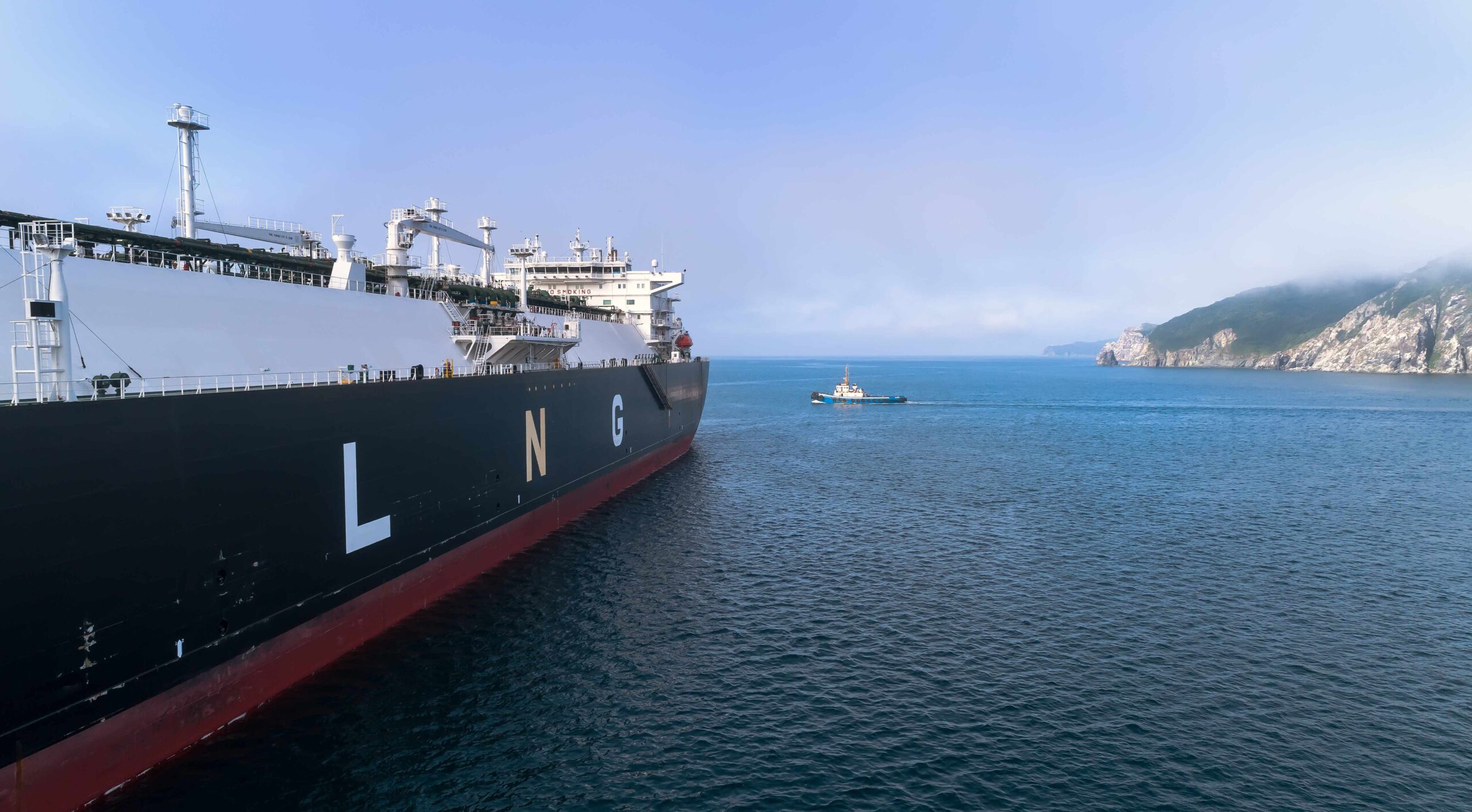
Coastal GasLink is a dangerous project
It blatantly violates indigenous rights

